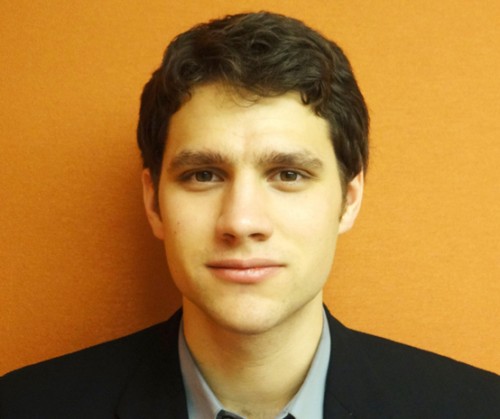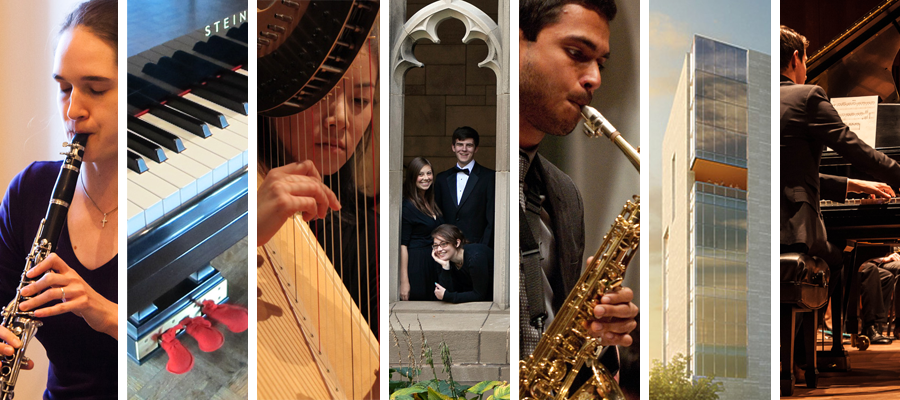 On Saturday, March 9th, you will join the University Symphony Orchestra as a winner of the biennial Concerto Competition, performing Brahms’ Piano Concerto No. 1 in D minor. (Details) How long have you been working on this piece? What about this concerto makes it particularly enjoyable to perform?
On Saturday, March 9th, you will join the University Symphony Orchestra as a winner of the biennial Concerto Competition, performing Brahms’ Piano Concerto No. 1 in D minor. (Details) How long have you been working on this piece? What about this concerto makes it particularly enjoyable to perform?
I’ve been working on this concerto for over a year and a half now, although I’ve taken several pauses to focus on other repertoire. It is one of my favorite pieces to listen to. It has an incredible breadth in terms of its individual themes and gestures, its emotional range, the far-reaching relationships between movements, and the sheer overall length. Moreover, you can actually feel this breadth in your hand as you play the piece, because the piano part is full of bulky chords, octaves, and arpeggios that stretch the hand. All of this gives the sense of a young composer stretching himself and the boundaries of his art. It feels right to be playing this concerto at the same age that Brahms was when he was working on the piece. I’m pushing my pianistic abilities in the same way that he was pushing himself compositionally when he wrote the concerto, although it’s safe to say that he had the harder job.
Aside from being a talented solo pianist, you have also worked with the Vocal Studies Program and the New Music Ensemble as a collaborative pianist. What do you enjoy most about the collaborative process?
Although I love playing as a soloist, in some ways it’s against my nature: I don’t necessarily like having all of the audience’s attention focused on me. Audiences, too, seem to enjoy seeing several people onstage and watching the interactions between them. I also think that, in music as in other things, there’s a great freedom that comes out of restraint. When I’m forced to follow a singer, another instrumentalist, or a conductor, the narrowing of possibilities in one arena can inspire more creativity in another. For example, maybe I have less freedom to be expressive with time, but this pushes me to find solutions through dynamics or articulation. Finally, it’s just fun to work with other people while rehearsing and performing. Playing solo can feel like such a solitary exercise.
How old were you when you began playing the piano? What has inspired you to continue with your piano studies throughout the years?
I started playing the piano when I was five. The biggest motivation for me is the inexhaustible repertoire of great music for the piano. There’s always a wonderful piece hanging just out of reach – technically, intellectually, or emotionally – and that’s inspiration enough to keep practicing and performing. I enjoy bringing my own point of view to a piece, and I’ve been very lucky to have good teachers to help me with that.
Do you have an all time favorite composer? Or, is there a particular musical period that you often feel drawn towards when choosing new repertoire?
My favorite composer tends to be whoever I’m working on at the moment. Again, there’s so much great piano music that we have the luxury of playing nothing but masterpieces if we want. But there are certain composers who never let me down. I love Schubert for his lyricism and for his ever-so-slightly unhinged sense of harmonic progression, both of which are fun and difficult to convey effectively on the piano. I’ve always admired Schumann for his ability to take something simple like a piece of a scale and turn it into the most beautiful and passionate melody. And Bach’s music is endlessly rewarding. It’s reassuring in how well it’s put together, but at the same time it’s startling in how imaginative and forward-looking it is.
How do you find time to balance your piano practice with your academic studies?
Fortunately, I find that efficiency in studying tends to breed efficiency in practicing, and vice versa. If it’s midterm season and I know that I’ll have a limited amount of time to practice, it motivates me to get my class work done on time, and then to make the most of my time in the practice room once I’m there. I’ve certainly learned to be more efficient since I came to school here. Even though practicing is hard work, I try to think of it as a break from other kinds of work. I’m lucky to be able to make artistic creativity a part of my daily routine.
Nathan Harris is a third-year music major and linguistics minor at the University of Chicago. He grew up in Newton, Massachusetts, where he took piano lessons with Margaret Bachelder and Jonathan Bass and studied in the New England Conservatory’s preparatory division. At Chicago, his teacher is Svetlana Belsky. In addition to performing solo on campus and elsewhere in Chicago, Nathan is the accompanist for the Vocal Program’s quarterly recitals and master classes and has played piano and celesta in the University Symphony Orchestra and New Music Ensemble.
Interview by Julia Tobiska
